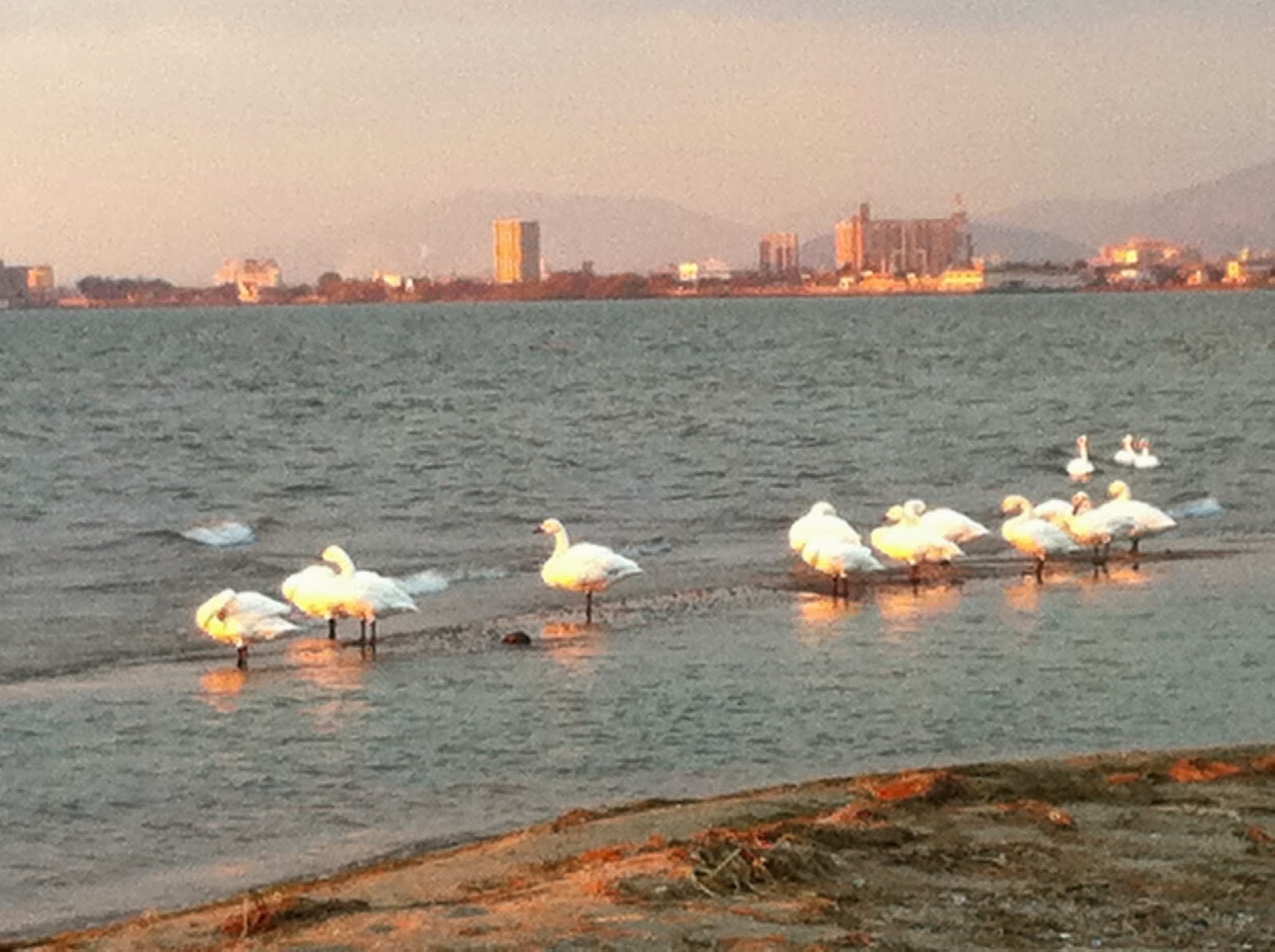 |
| Whistling Swans (Cygnus columbianus) and Bean Geese (Anser Fabalis) on Lake Biwa in Nagahama |
Shichijuni-kou (72 Seasons) Calendar Listing
晩春 Banshun: "Late Spring"
Season No. 5: 清明, Seimei:
"Clear And Bright"
 |
| Mute Swans (Cygnus olor) on promenade in the moat at Hikone Castle, Shiga. |
Climate No. 14: 鴻鴈北
Kougan Kaeru: "Migrating Waterfowl Head North"
(April 9 -April 13)
The swallows may have arrived, but in Japan, it's time for the swans and geese to go. Master commuters of the bird world, these migrating waterfowl rack up the mileage points every year, flying back and forth to favorite feeding and breeding grounds in a perpetual loop. Along their arduous journey, some birds get left behind and are adopted by flocks of different species. Still others wander away from their extended families to create their own flocks.
 |
| Common Gulls (Larus canus, a seasonal species for Shiga) on the wind above Lake Biwa, Nagahama. |
But no matter what they do, only one thing is certain: to survive, they have to keep moving, ever sensitive to minute changes in their environment. When their feeding grounds are all picked over and pooped on, it's time to move on.
 |
| Webbed Footprints (Nagahama, Shiga) |
 |
| Pintails (Anas acuta) scooting around Lake Mishima (Nagahama, Shiga) |
 |
| Whistler Swans taking a nap on the shores of Lake Biwa (Nagahama, Shiga). |
Apparently the haiku poet Basho, who often traveled around major waterfowl hub Lake Biwa in Shiga Prefecture, was similarly moved by a flock of geese he saw leaving in the spring for their summer home:
"Friends part forever-
Wild geese
Lost in clouds." -Matsuo Basho
Separation is never a happy thing. We still love, and the pain is sweet. But we move on despite of it, knowing the pain will eventually dissipate with time. Travel helps the memories fade a little faster. My friend, like the swans and geese of Shiga, was there one day, nowhere to be found the next. Parted forever? I have to assume so.
I see a lesson to be learned from this let-down, however, that's far too powerful to be left ignored: Suffering comes from attachment. Nothing is permanent, not even frienship. There's a saying along these lines, founded in Buddhism, that accurately reflects the truly transient nature of human relationships:
一期一会, Ichi-go, ichi-e.
"One time, one meeting."
 |
| Statue of Ii Naosuke at Hikone Castle, Shiga. |
But the Japanese also see this phrase in the positive, for it can mean that every meeting, like every moment, is purely unique. Our time spent in the company of others must be done so in the spirit of servitude. The tea ceremony (茶道 sado) is a prime example of this concept in practice, with every motion choreographed to appear as if executed with the utmost grace. Every motion, like every moment, is a gift shared with the guest. Each person who crosses our path deserves our kindness. Sometimes, this is tough to remember, especially when we need to let go of those who cause us pain.
Just as the migratory birds must keep moving to survive, our hearts must remain open to the new people we meet, unafraid of attachment or injury. If they're not, then we suffer. But if we truly live in the moment, there's no need to attach. Leaving a frienship means room in the heart for another to begin. And so it goes. (So we come and go).
Flavor of the Season: 苺, Ichigo, Strawberries
Though the peak season for strawberries in Japan is actually the middle of March, many restaurant chains hold their strawberry fairs and promotional campaigns this time of year. On a chilly, rainy Sunday afternoon, a fellow expat friend and I found ourselves unable to resist their juicy, decadent pull. Sweet with just the right amount of tang, fresh, scarlet strawberries harmonize effortlessly with a dollop of pillowy whipped cream.
 |
| Strawberry Parfait at Gusto Restaurant (nationwide chain). |
Copyright 2014 Genkilee, Gen. All rights reserved. No part of this blog (written or photo content) may be reproduced or reprinted without the expressed permission of the author.
No comments:
Post a Comment